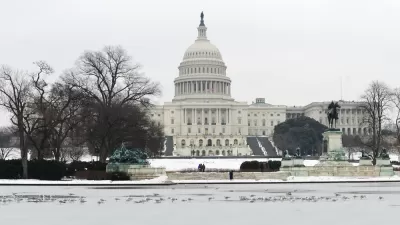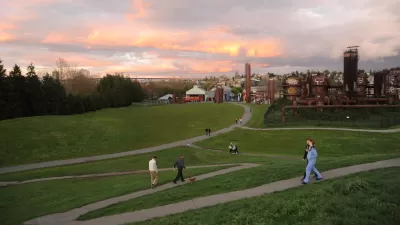A proposed Climate Planning Unit could help the federal government guide comprehensive climate policy and manage project costs.

A report from the Brookings Institution outlines suggestions for "how the White House can immediately kick-start climate solutions across our built environment through a new Climate Planning Unit (CPU)." The report suggests that the proposed office could "reduce the federal fiscal impacts of climate change by developing strategic intra-agency and cross-agency mitigation and adaptation projects and programs." By creating a federal office focused on climate change, the government can more effectively "identify opportunities (and outcomes) of effective climate action with direct and capturable federal financial benefits."
Federal investment in coordinated climate change policy has the potential to elevate climate concerns in development policies across the country, write Joseph W. Kane, Jenny Schuetz, Shalini Vajjhala, and Adie Tomer. "For instance, an 18F model can serve as a template for staffing, funding, and growing a new, dedicated federal unit focused on forward-looking research, metrics, and plans." The Blueprint developed by the Brookings Institution "supports the new high-level international and domestic climate leadership in the White House by establishing a stable basis for long-term, fiscally defensible, bipartisan federal climate action to complement other legislative and executive actions." The report also recommends a focus on "low-hanging fiscal fruit" that can help projects get off the ground faster and kickstart long-term efforts.
FULL STORY: How a federal Climate Planning Unit can manage built environment risks and costs

Planetizen Federal Action Tracker
A weekly monitor of how Trump’s orders and actions are impacting planners and planning in America.

Congressman Proposes Bill to Rename DC Metro “Trump Train”
The Make Autorail Great Again Act would withhold federal funding to the system until the Washington Metropolitan Area Transit Authority (WMATA), rebrands as the Washington Metropolitan Authority for Greater Access (WMAGA).

DARTSpace Platform Streamlines Dallas TOD Application Process
The Dallas transit agency hopes a shorter permitting timeline will boost transit-oriented development around rail stations.

Supreme Court Ruling in Pipeline Case Guts Federal Environmental Law
The decision limits the scope of a federal law that mandates extensive environmental impact reviews of energy, infrastructure, and transportation projects.

Texas State Bills to Defund Dallas Transit Die
DART would have seen a 30% service cut, $230M annual losses had the bills survived.

Bikeshare for the Win: Team Pedals to London Cricket Match, Beats Rivals Stuck in Traffic
While their opponents sat in gridlock, England's national cricket team hopped Lime bikes, riding to a 3-0 victory.
Urban Design for Planners 1: Software Tools
This six-course series explores essential urban design concepts using open source software and equips planners with the tools they need to participate fully in the urban design process.
Planning for Universal Design
Learn the tools for implementing Universal Design in planning regulations.
Roanoke Valley-Alleghany Regional Commission
City of Mt Shasta
City of Camden Redevelopment Agency
City of Astoria
Transportation Research & Education Center (TREC) at Portland State University
US High Speed Rail Association
City of Camden Redevelopment Agency
Municipality of Princeton (NJ)





























